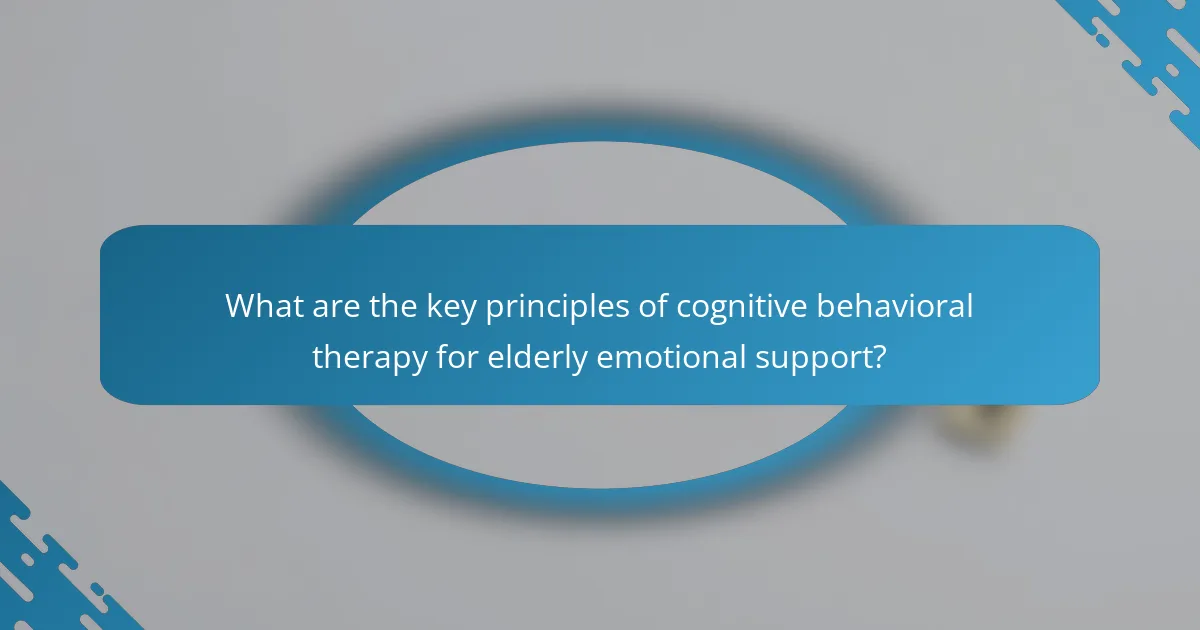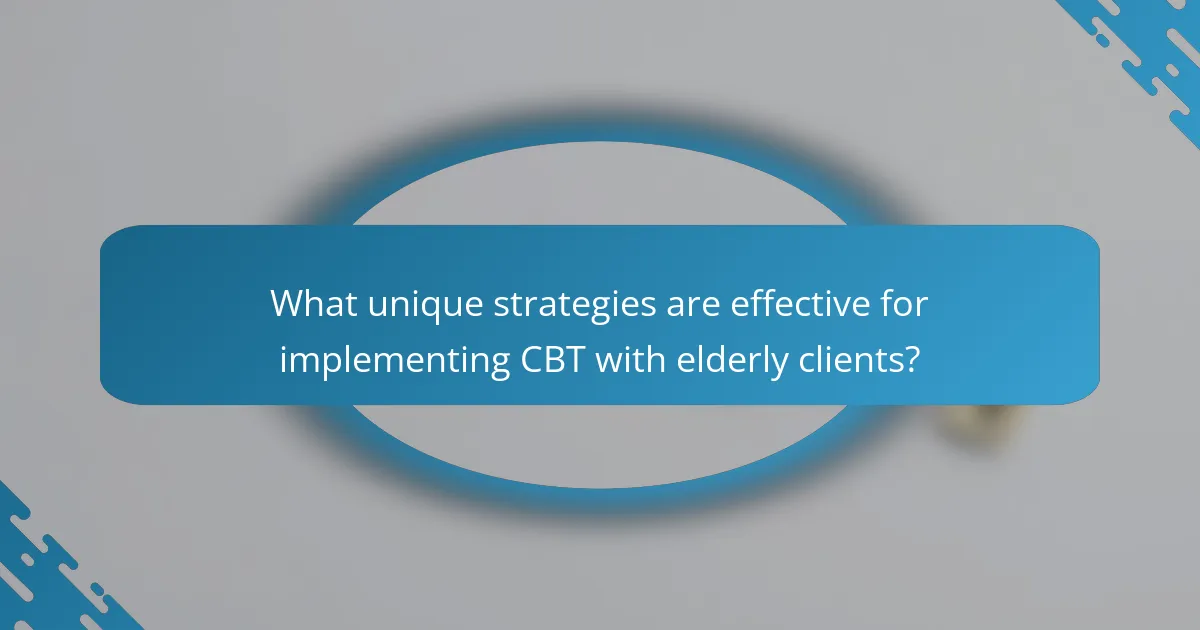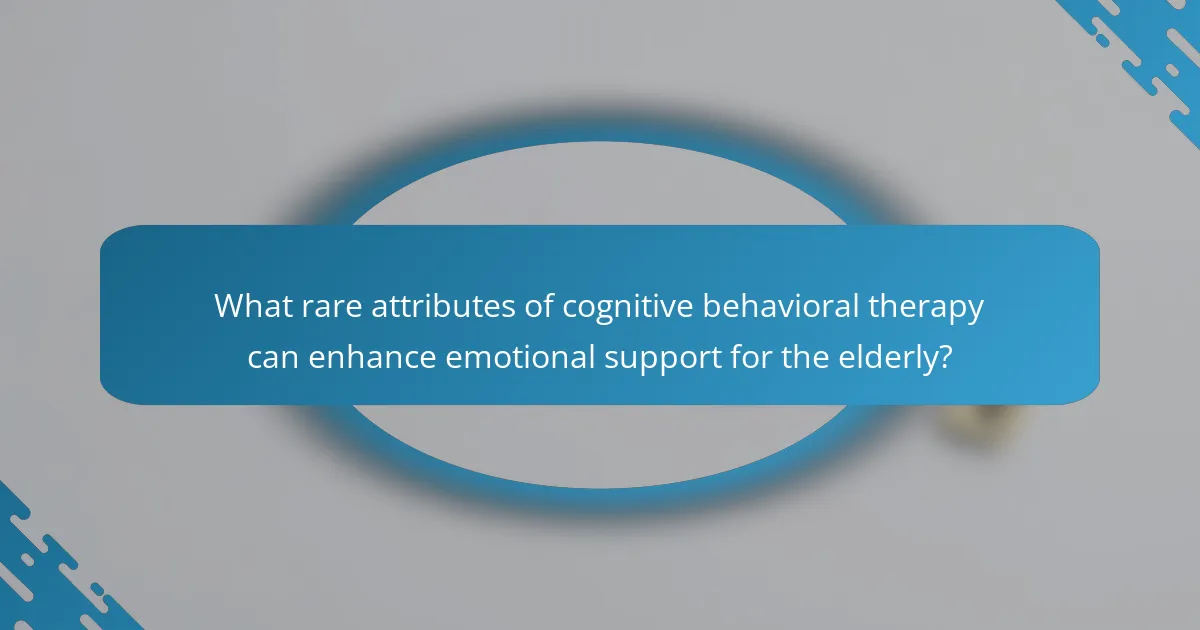Cognitive Behavioral Therapy (CBT) offers essential strategies for emotional support in the elderly, addressing challenges like depression and anxiety. Key techniques include cognitive restructuring to challenge negative thoughts, behavioral activation to encourage meaningful activities, and mindfulness practices to enhance emotional resilience. Tailored approaches that involve family and promote social engagement further strengthen support systems for seniors. Regular assessment ensures that these strategies adapt to the evolving needs of older adults, fostering improved emotional well-being.

What are the key principles of cognitive behavioral therapy for elderly emotional support?
Cognitive Behavioral Therapy (CBT) for elderly emotional support focuses on altering negative thought patterns. Key principles include cognitive restructuring, behavioral activation, and mindfulness techniques.
Cognitive restructuring helps seniors identify and challenge distorted thoughts, improving emotional well-being. Behavioral activation encourages engagement in meaningful activities, combating feelings of isolation. Mindfulness techniques promote present-moment awareness, reducing anxiety and enhancing emotional resilience.
These strategies are tailored to address common emotional challenges in the elderly, such as depression and anxiety. By fostering a supportive therapeutic relationship, CBT empowers seniors to develop coping skills and improve their quality of life.
How does cognitive behavioral therapy address emotional challenges in elderly individuals?
Cognitive Behavioral Therapy (CBT) effectively addresses emotional challenges in elderly individuals by providing structured strategies. CBT helps seniors identify and modify negative thought patterns, reducing anxiety and depression. It also teaches coping skills, enhancing emotional resilience. Studies indicate that CBT can lead to significant improvements in mental health outcomes for older adults. This approach is particularly beneficial as it empowers individuals to manage their emotions actively, fostering a sense of control and well-being.
What are the benefits of cognitive behavioral therapy for older adults?
Cognitive Behavioral Therapy (CBT) offers significant benefits for older adults, enhancing emotional support and mental well-being. It effectively reduces symptoms of depression and anxiety, promoting healthier coping strategies.
CBT helps older adults reframe negative thoughts, improving their overall outlook on life. It fosters better communication skills, enhancing relationships with family and friends. Additionally, CBT can lead to increased engagement in social activities, reducing feelings of isolation.
Research indicates that older adults respond well to CBT, with studies showing a 60% improvement rate in mental health outcomes. This therapeutic approach is adaptable, allowing for personalized strategies that cater to individual needs and life experiences.
How does CBT improve mental health outcomes?
Cognitive Behavioral Therapy (CBT) significantly enhances mental health outcomes for the elderly by providing effective emotional support. It helps individuals recognize and modify negative thought patterns, leading to improved emotional regulation and resilience.
CBT strategies include structured problem-solving, cognitive restructuring, and behavioral activation. These techniques empower elderly clients to manage anxiety, depression, and stress more effectively. Research indicates that CBT can reduce symptoms of depression by up to 50% in older adults, enhancing their overall quality of life.
Additionally, CBT fosters a supportive therapeutic relationship, which is crucial for elderly individuals who may experience isolation. This connection can lead to increased motivation and engagement in treatment, further improving mental health outcomes.
Overall, CBT serves as a powerful tool for promoting emotional well-being in the elderly, addressing unique challenges they face in mental health.
What role does CBT play in managing anxiety and depression?
Cognitive Behavioral Therapy (CBT) is effective in managing anxiety and depression among the elderly by providing structured strategies to modify negative thought patterns. CBT helps seniors identify triggers, develop coping mechanisms, and enhance emotional resilience. Studies show that CBT can lead to significant reductions in symptoms, improving overall quality of life for elderly individuals. The approach is tailored to address unique challenges faced by this age group, such as isolation and chronic health issues, making it a valuable tool for emotional support.

What unique strategies are effective for implementing CBT with elderly clients?
Cognitive Behavioral Therapy (CBT) strategies for elderly clients should focus on individualized approaches that address their unique needs. Effective strategies include using relatable examples, promoting social engagement, and integrating family involvement.
Encouraging the use of journaling can help clients articulate feelings and thoughts, fostering self-reflection. Cognitive restructuring techniques can also be tailored to challenge negative beliefs specific to aging.
Incorporating mindfulness practices enhances emotional regulation and reduces anxiety. Group therapy settings can provide social support and build community, which is vital for emotional well-being in elderly populations.
Regular assessment of progress ensures that strategies remain relevant and effective, adapting to the evolving needs of elderly clients.
How can therapists tailor CBT techniques for older populations?
Therapists can tailor Cognitive Behavioral Therapy (CBT) techniques for older populations by adapting communication styles, incorporating life experiences, and using age-appropriate examples. Adjustments may include simplifying language and providing more time for reflection.
Therapists should focus on the unique cognitive and emotional needs of older adults, such as managing grief, loneliness, or chronic illness. Techniques like cognitive restructuring can be beneficial, helping clients challenge negative thoughts related to aging.
Integrating mindfulness practices can enhance emotional regulation, promoting relaxation and reducing anxiety. Additionally, therapists can leverage social support systems to foster community engagement and mitigate feelings of isolation.
It’s crucial to ensure that interventions are culturally sensitive and respect the values and beliefs of older clients. By personalizing approaches, therapists can effectively support the emotional well-being of elderly individuals.
What are some common misconceptions about CBT for the elderly?
Cognitive Behavioral Therapy (CBT) is often misunderstood for the elderly. One common misconception is that CBT is ineffective for older adults, but research shows it can significantly improve emotional well-being. Another misconception is that elderly individuals cannot learn new coping strategies, whereas many adapt well to CBT techniques. Additionally, some believe that therapy is only for severe mental health issues, while CBT can also address everyday stressors and enhance quality of life. Finally, there is a belief that older adults prefer medication over therapy, yet many appreciate the skills CBT provides for managing their emotions.

What rare attributes of cognitive behavioral therapy can enhance emotional support for the elderly?
Cognitive Behavioral Therapy can enhance emotional support for the elderly through its rare attributes, such as personalized coping strategies and intergenerational communication techniques. These unique approaches foster resilience and social connections, addressing specific emotional needs. Additionally, the incorporation of mindfulness practices can improve emotional regulation and self-awareness. These rare attributes contribute to a tailored therapeutic experience, promoting overall well-being in elderly individuals.
How can technology be integrated into CBT for seniors?
Technology can enhance Cognitive Behavioral Therapy (CBT) for seniors by providing accessible tools for emotional support. Digital platforms, such as mobile apps and teletherapy services, allow seniors to engage with CBT techniques conveniently. These technologies can offer personalized exercises, track progress, and facilitate communication with therapists. Additionally, virtual reality can simulate real-life scenarios to practice coping mechanisms, making therapy more interactive. Integrating technology into CBT can reduce barriers to access and improve engagement, ultimately fostering better mental health outcomes for elderly individuals.
What are the challenges of applying CBT in group settings for older adults?
Applying Cognitive Behavioral Therapy (CBT) in group settings for older adults presents several challenges. These include cognitive decline, which may hinder participation, and diverse emotional needs that can complicate group dynamics. Additionally, older adults may struggle with social anxiety, making it difficult to engage openly. Facilitators must also navigate varying levels of familiarity with CBT concepts, which can impact the effectiveness of the therapy. Finally, logistical issues such as transportation and accessibility can further limit participation in group sessions.

What culturally relevant adaptations are necessary for effective CBT?
Culturally relevant adaptations for effective Cognitive Behavioral Therapy (CBT) in elderly emotional support include tailoring communication styles, integrating cultural beliefs, and respecting family dynamics. Understanding the unique life experiences and values of elderly individuals enhances therapeutic rapport. For example, therapists should consider language preferences and cultural expressions of distress. Additionally, involving family members in the therapy process can foster a supportive environment, crucial for this demographic. Adapting techniques to align with cultural norms ensures the therapy is relevant and effective.
How do cultural perceptions influence the acceptance of CBT among the elderly?
Cultural perceptions significantly impact the acceptance of Cognitive Behavioral Therapy (CBT) among the elderly. Many older adults may view mental health treatment as stigmatizing, leading to reluctance in seeking help.
Traditional beliefs about mental health can create barriers. For instance, some cultures prioritize family support over professional therapy, viewing emotional struggles as personal matters rather than medical issues. This unique attribute of cultural context can hinder the integration of CBT into their lives.
Education about CBT’s benefits is crucial. Programs tailored to address specific cultural concerns can help shift perceptions and promote acceptance. As a result, increased awareness can enhance emotional support for the elderly through effective CBT strategies.
What specific adaptations can improve engagement in diverse populations?
Cognitive Behavioral Therapy (CBT) strategies can enhance engagement among diverse elderly populations through tailored communication and culturally relevant practices. Adapting language to meet varying literacy levels fosters understanding. Incorporating familiar cultural references increases relatability. Group sessions can leverage shared experiences, promoting connection. Individualized approaches address unique emotional needs, ensuring inclusivity.

What are the common pitfalls in delivering CBT to elderly clients?
Common pitfalls in delivering Cognitive Behavioral Therapy (CBT) to elderly clients include underestimating cognitive decline, overlooking physical health issues, and failing to adapt communication styles. Therapists may not recognize that older adults often have unique emotional responses and life experiences that influence therapy. Additionally, neglecting to involve family members can hinder progress. It’s crucial to tailor strategies to address these factors effectively.
What strategies can therapists use to avoid these pitfalls?
Therapists can employ several strategies to avoid pitfalls in cognitive behavioral therapy for elderly emotional support. Active listening helps build trust and understanding. Tailoring interventions to individual needs ensures relevance and effectiveness. Regular feedback sessions allow clients to express concerns and adjust therapy accordingly. Utilizing simple language enhances communication and comprehension. Finally, incorporating family involvement can provide additional support and context.
How can ongoing training improve the effectiveness of CBT for elderly emotional support?
Ongoing training enhances the effectiveness of Cognitive Behavioral Therapy (CBT) for elderly emotional support by ensuring therapists remain updated on best practices and techniques. Continuous education allows therapists to adapt strategies to meet the unique emotional needs of elderly clients. Training can also improve empathy and communication skills, fostering a stronger therapeutic alliance. Furthermore, it equips therapists to incorporate new research findings, such as the impact of age-related cognitive changes on therapy outcomes, ultimately leading to better emotional support for elderly individuals.

What best practices should therapists follow when using CBT with older adults?
Therapists should employ tailored Cognitive Behavioral Therapy strategies to effectively support older adults. Focus on building trust, using clear language, and addressing age-related cognitive changes.
1. Establish a strong therapeutic alliance to foster openness.
2. Utilize cognitive restructuring to challenge negative thoughts.
3. Incorporate behavioral activation to encourage engagement in enjoyable activities.
4. Adapt techniques to accommodate cognitive decline, ensuring clarity and simplicity.
5. Promote mindfulness practices to enhance emotional regulation.
6. Involve family members when appropriate to strengthen support systems.
How can therapists ensure a supportive environment for elderly clients?
Therapists can ensure a supportive environment for elderly clients by fostering trust and open communication. Establishing a comfortable setting reduces anxiety and promotes engagement. Active listening and empathy are crucial in understanding their unique emotional needs. Incorporating cognitive behavioral therapy strategies can empower clients to address their feelings and thoughts effectively.
What are the key takeaways for implementing CBT strategies effectively?
Effective implementation of Cognitive Behavioral Therapy (CBT) strategies for elderly emotional support requires a structured approach. Focus on building strong therapeutic relationships, ensuring clear communication, and adapting techniques to individual needs. Regularly assess progress and adjust interventions as necessary. Encourage active participation in sessions to foster ownership of the therapeutic process. Utilize evidence-based practices tailored for elderly populations, considering their unique emotional and cognitive challenges.